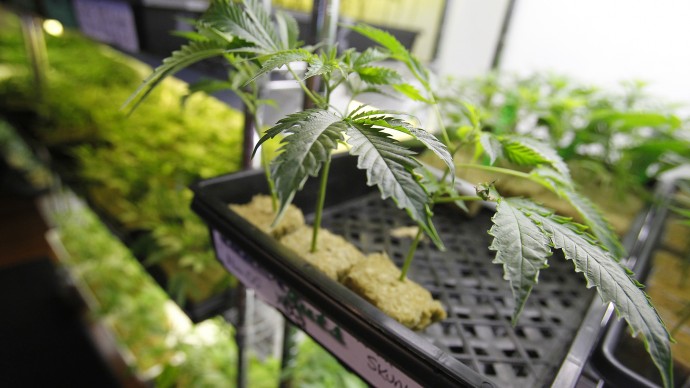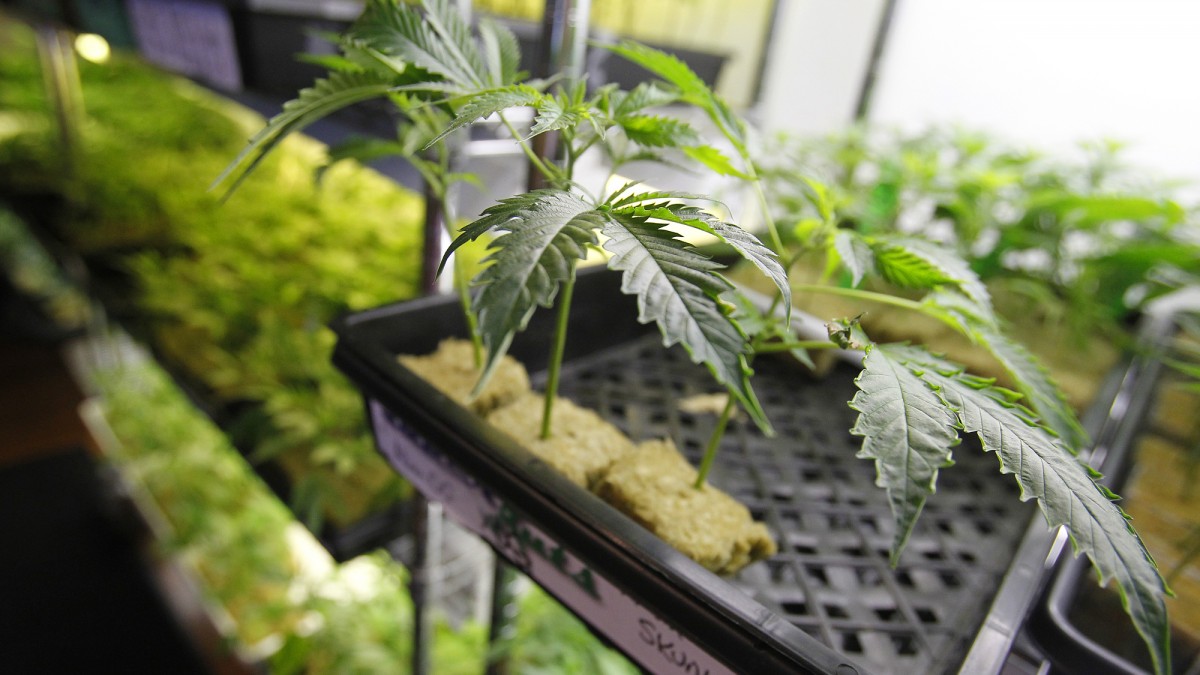
(MintPress) – It’s no surprise legalization of marijuana has received support from about 56 percent of Americans. Despite being a prohibited substance in the U.S. for 75 years, nearly 29 million Americans use it annually, resulting in marijuana becoming the third most popular recreational drug behind alcohol and tobacco. Various states have attempted to decriminalize marijuana, pass medicinal marijuana initiatives and legalize the drug over the years. So far 17 states and the District of Columbia have found success with decriminalization and legalization of medicinal marijuana initiatives, but non-medicinal related legalization efforts, despite having large public support in polls prior to the actual vote, have always lost. The defeat of legalization is largely due to the fact that a majority of marijuana growers and sellers, known as gangapreneurs, are funding and voting against legalization.
In an interview with MintPress, Allen St. Pierre, Executive Director of the National Organization for the Reform of Marijuana Laws (NORML), a marijuana legalization advocacy group, said anti-prohibitionists, including “sellers of marijuana have joined with narks, pee testers and beer testers,” in voting against legalization.
If marijuana is legalized, consumers will no longer face arrests, drug tests, struggle to find work, have to worry about their children being taken away or losing student loans, he added. But most concerning for the growers and sellers is that their high profits, disappear. Users won’t be willing to pay $600 for “dried vegetable matter that is easily grown and ubiquitous. Marijuana isn’t called ‘weed’ for nothing,” St. Pierre said.
California: Paving the way?
In 1996 California became the first state to legalize medicinal marijuana use, and in 2010 California was on track to become the first state to legalize recreational marijuana use with a piece of legislation entitled Proposition 19.
The legislation failed to pass by a little more than three percentage points. Most Americans assumed the defeat of Proposition 19 was a devastating blow to marijuana growers and users, especially in the “Emerald Triangle” region of California – Humboldt, Mendocino and Trinity counties – where many of the growers are located. But in reality, news of Proposition 19 failing to pass produced celebrations in the area, much to the dismay of users.
Led by marijuana connoisseur and writer Dragonfly de la Luz, the group “Stoners Against Prop 19” encouraged Californians not to vote “Yes” on Proposition 19, under the premise that the legalization law as written would be more detrimental to users than not having legalization at all.
In an attempt to explain why a regular user such as herself was against Proposition 19, de la Luz said when she first heard California was legalizing pot she was excited. “I thought it was a dream come true,” she said. “Then I read [the legislation] and realized it was a nightmare.
“Californians would be able to legally possess, process, share or transport only one ounce of pot,” de la Luz said. “And they would be able to grow it only in a 25-square-foot area … These exotic strains [of marijuana] that we know and love are going to quickly become obsolete because a 5-by-5 space is just not enough space to breed and experiment with all these new strains. It would be a real shame if we lost all of this variety.”
In response to de la Luz’s arguments, “Radical” Russ Belville of NORML took time to “debunk” some of the information de la Luz had shared. He said while it was true the law only allowed a person to carry one ounce of marijuana, they could have more at home. Legally having the ability to possess and use marijuana would be beneficial to recreational and medicinal users in that smelling like marijuana would no longer be probable cause for a search of a person or their property.
Similarly, Belville said the gardens would have been limited to 25-square-foot areas, but added that users currently growing illegal plots were not going to decrease the size of their gardens to a 5-by-5 space just because it was legal. He continued on to say growers with Prop 215 (medical marijuana) recommendations would still be able to grow larger plots under the legislation and companies growing commercial marijuana would likely want as many strains as possible to entice more customers.
Belville emphasized that with the passing of Proposition 19, benefits to growers and users included that an increase in water or electricity bills would no longer be probable cause for police to obtain a search warrant, and skunky-smelling plants would be a nuisance for neighbors and not a reason to call the police.
But it’s not just a potential loss of variety that concerned users like de la Luz. Many worried the legislation would turn marijuana into a corporate industry. “We’re kind of like anti-Wal-Mart and anti-McDonald’s,” she said. “So for [the government] to sneak in and turn cannabis into a corporation, that’s disgusting.”
“I don’t want Anheuser-Busch handling pot or have to buy Marlboro marijuana,” Shaun Ramos explained to the New York Times. “This is all about corporate control.”
To this argument, Belville responded that cities and counties, local forms of government, would decide who was allowed to grow marijuana – it wouldn’t solely be in the hands of corporations.
While almost every member of “Stoners Against Prop 19” believes marijuana should be legalized, the group proclaimed that the flaws of the legislation were too damaging, especially since other states would draft similar laws if the initiative would have passed.
“Their argument,” says St. Pierre referring to the anti-prohibitionists, is that marijuana “should remain illegal if the law isn’t perfect enough.”
Another large concern for the group was that commercial corporate growers like Monsanto, had major shareholders like George Soros, donating millions in support of the legislation, hoping to patent strains of marijuana. At a debate on Proposition 19, de la Luz said Monsanto had patents on strains ready to go incase the legislation passed, which would allow Monsanto to sue anyone growing that specific strain of marijuana in their own garden.
Groups like NORML, who were in-favor of the legislation, openly referred to the “Stoners Against Prop 19” group as traitors to the legalization movement, who were spreading disinformation about what the initiative would have done. Steve Elliott wrote on the website Toke of the Town that the group had “shamelessly allied themselves with the law enforcement and prison lobbies …” by voting against the legislation.
While de la Luz and other members of “Stoners Against Prop 19” tried to steer their reasons for voting against legalization away from those involving reduced profit for growers with the increased competition, not every member got the memo.
A friend of de la Luz and small-time grower named Chris Wilson told NPR that Proposition 19 would put him out of business. “They’re going to tax the hell out of me, and I barely make it as it is. I’m just getting by. They’re taxing everybody they can, just because California is in debt. They see the money can be made, like unbelieveable taxation, enough to push me out of business.”
Similarly another grower named Jay, who didn’t give his last name because he sells on the black market, said he was against Proposition 19 because he’s scared the price of marijuana would drop. “[Growers] have invested money here [in the Emerald Triangle], we all live here … Everyone’s scared because we don’t know what the prices are going to be. Already, the prices have gone down and down. It’s harder to sell it.”
It’s not just a reduction in profit that concerns growers – government regulation of marijuana would mean that growers would not be able to use carcinogenic pesticides on the plants, would have to pay taxes and apply and pay for licenses.
The future
Despite 17 states legalizing the medicinal use of marijuana, it’s worth remembering that in the eyes of the federal government, the drug is still illegal. St. Pierre shared with MintPress that “regrettably, [the federal government] is very, very active” in its crackdown especially in those states that have legalized medical marijuana use.
When it comes to enforcing federal marijuana laws, there isn’t one political party that is completely in support of legalization. The Democratic Party has a reputation for being less socially conservative than its Republican peers, but from 1996 to the year 2000 when Democratic President Bill Clinton was in office, the federal government was extremely active, especially in California. “[They] shut down dispensaries and stopped doctors from making recommendations,” St. Pierre told MintPress.
In 2000 when Republican President George W. Bush took over, he, along with California’s Gov. Arnold Schwarzenegger, had laissez faire attitudes that allowed the marijuana industry to explode in California. Then Obama came into office.
Obama’s administration initially said that states have greater autonomy and spoke on how users are not criminals. St. Pierre says Obama’s support for decriminalizing marijuana was an important step in political recognition of the benefits marijuana has.
In 2009, the Obama team released a memo stating that although marijuana laws had not changed federally, the federal government had other priorities than going after large scale growers. A year later the administration sent out another memo clarifying that the previous memo was not granting states the right to allow medical marijuana, but that the federal government was not going to focus on those users who grow small marijuana plants in their own home.
Yet the federal government has continued to raid large scale retailers around the country. According to St. Pierre, since last November, Obama has shut down more dispensaries than Bush did in his eight years in office.
According to St. Pierre, once legalization becomes politically viable and salient, meaning legalization is favored by at least 60 percent of the public nationally, then marijuana reforms will happen in the U.S. Support for federal legalization crossed the 50 percent threshold last November, according to a Gallup poll, which St. Pierre says is right on track for an expected legalization victory in 2020 or 2021.
While the economics of keeping marijuana illegal benefit big money organizations, it will be extremely difficult for politicians to defend prohibition in the future since it causes so much crime, violence and corruption, says Neill Franklin, a retired Baltimore narcotics cop and the executive director of the advocacy group Law Enforcement Against Prohibition.
As public support of legalization continues to rise, the U.S. will see a battle between the public and large lobby groups. Only time will be able to tell the amount of uproar that will occur when marijuana users discover that growers and sellers are largely behind the continued prohibition of marijuana.


